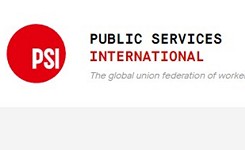
PSI – Public Services International – People Over Profit
Privatisation - PSI - The global union federation of workers in public services
By David Boys
There is more than enough wealth to deliver quality public services for all - if corporations and the very wealthy pay their fair share, and if governments invest and spend wisely instead of privatising in the interests of corporations and the wealthy.
Quality public services, provided to all, is the only way to achieve human rights, gender equality and social justice. These services also support the wider economy by providing public infrastructure, research and innovation, a healthy and skilled workforce, and strong and stable justice and regulatory institutions.
Public services have consistently proven to be more efficient and effective when owned and managed by the public.
Yet underinvestment in public services and infrastructure is leading to lower growth, higher inequality, less social cohesion and a toxic political reaction which fuels austerity, nationalism and xenophobia.
Many corporations see the public sector as a new market for profit extraction. They promote a range of myths, including the efficiencies of cutthroat private competition.
A major driver of privatisation is the expected profit produced by widespread job cuts and lower labour costs. Privatisation is used to break unions, collective agreements, drive down wages and labour conditions and introduce precarious work.
We lead the global fight against privatisation, sharing strategies and research to win the fight for publicly provided services, accessible to all.
Privatisation: against the public interest
Privatisation, outsourcing and cuts disproportionately affect sectors with higher rates of female workers and reduces services such as childcare which help alleviate women’s burden of unpaid domestic work.
This reduces women’s integration to the labour market.
The decision to privatise is rarely made with the participation and consent of those affected or with adequate information.
External institutions such as the World Bank have consistently imposed privatisations onto local communities as part of their infamous Structural Adjustment Programs.
Instead of demanding that corporations and the very rich pay their share of tax, rising public debt is used as a pretext for privatizing assets, as in Greece and elsewhere.
Even when a government is voted in to end failed privatisations, these contracts combined with the influence of institutions such as the troika, significantly restrict their ability to remunicipalise without huge pay-outs to investors.
Meanwhile costs for project failures or 'non-profitable' aspects of public services (such as provision to poorer citizens who can not afford to pay the bills) are almost invariable borne by the public.
Source: WUNRN – 22.02.2024






























